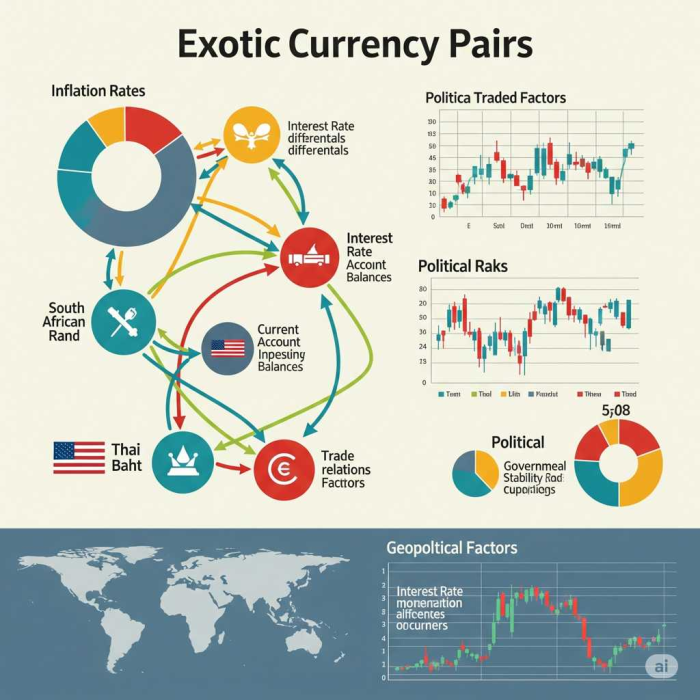Navigating the Wild West | Understanding the Economic and Political Forces Behind Exotic Currency Pairs
Forex trading often conjures images of major currency pairs like EUR/USD or GBP/JPY, with their deep liquidity and relatively predictable movements. But for the adventurous trader, the world of "exotic" currency pairs offers a thrilling, albeit riskier, frontier. These pairs, typically combining a major currency with one from a developing or emerging market (e.g., USD/TRY, EUR/ZAR), are driven by a unique interplay of economic and political factors that demand a nuanced understanding.
So, what exactly fuels the dramatic swings and potential rewards (and risks!) of exotic pairs? Let's dive in.

The Economic Drivers: Beyond the Big Picture
While core economic principles apply to all currencies, their impact is often magnified and less predictable in emerging markets.
- Interest Rate Differentials and the Carry Trade: One of the most compelling economic drivers for exotic pairs is the interest rate differential. Emerging market central banks often maintain higher interest rates to combat inflation or attract foreign investment. This creates opportunities for "carry trades," where traders borrow in a low-interest-rate currency (like the Japanese Yen) and invest in a high-interest-rate exotic currency. While tempting, this strategy thrives in low-volatility environments and can quickly unravel if the high-yielding currency depreciates.
- Inflation and Economic Growth: High inflation erodes purchasing power and typically weakens a currency. Emerging economies are often more susceptible to inflationary pressures due to supply chain vulnerabilities, commodity price shocks, or less mature monetary policy frameworks. Conversely, robust economic growth, driven by strong exports, foreign direct investment, or domestic consumption, can strengthen an exotic currency.
- Current Account Balances and Trade Flows: A country's current account reflects its balance of trade in goods, services, and income. A persistent current account deficit indicates that a country is spending more on foreign trade than it earns, often leading to currency depreciation as it needs to borrow foreign capital. Exotic currencies are particularly sensitive to shifts in commodity prices (if the country is a major exporter/importer) and global trade dynamics.
- Public Debt and Fiscal Health: High levels of public debt can signal fiscal instability and raise concerns about a country's ability to service its obligations. This can deter foreign investors and lead to currency weakness. In emerging markets, perceptions of debt sustainability are often more volatile and can trigger sharp capital outflows.
- Foreign Reserves and Capital Controls: The level of a country's foreign currency reserves provides a buffer against external shocks. Low reserves can make an exotic currency vulnerable to speculative attacks. Some emerging markets also employ capital controls to manage currency flows, which can restrict liquidity and impact trading.
The Political Landscape: The Unpredictable Element
Political factors often exert an outsized influence on exotic currency pairs, leading to sharp and unpredictable movements. This is arguably the most challenging aspect to forecast.
- Political Stability and Governance: Political instability, such as frequent changes in government, civil unrest, or social turmoil, significantly undermines investor confidence. This uncertainty can lead to capital flight and rapid currency depreciation. Conversely, a stable political environment and good governance practices attract investment and support currency strength.
- Geopolitical Events: Wider geopolitical tensions, regional conflicts, or even major international policy shifts can have a profound impact on emerging markets. For instance, trade disputes between major global powers can negatively affect the currencies of countries heavily reliant on those trading relationships. Natural disasters or health crises can also introduce significant economic and political uncertainty.
- Policy Intervention and Central Bank Credibility: Central banks in emerging markets may intervene directly in currency markets to stabilize their currencies, often through buying or selling foreign reserves. Unexpected policy changes, shifts in monetary policy (like sudden interest rate hikes or cuts), or concerns about the central bank's independence and credibility can trigger significant currency volatility.
- Elections and Referendums: Major political events like national elections or referendums can introduce considerable uncertainty, as the outcome can lead to drastic changes in economic or fiscal policy. Traders often price in this uncertainty, leading to increased volatility before and after such events.
- Corruption and Rule of Law: Perceptions of corruption or a weak rule of law can deter foreign investment and lead to a lack of confidence in a country's economic prospects, weighing heavily on its currency.
Trading the Exotics: A Word of Caution
The heightened volatility and lower liquidity of exotic currency pairs translate into wider bid-ask spreads and potentially higher trading costs. While they offer diversification opportunities and the potential for significant returns, they also come with increased risk. Successful trading of exotic pairs demands:
- Thorough Fundamental Analysis: A deep understanding of the economic and political landscape of the countries involved is paramount. Staying abreast of local news, economic data releases, and geopolitical developments is crucial.
- Robust Risk Management: Given the potential for sharp swings, strict risk management strategies, including appropriate position sizing and stop-loss orders, are non-negotiable.
- Patience and Discipline: Exotic markets can be illiquid and prone to sudden, unexpected movements. Patience and discipline are essential to avoid impulsive decisions.
In conclusion, exotic currency pairs are far from "exotic" in their economic and political underpinnings. Instead, they are highly sensitive barometers of the unique challenges and opportunities present in emerging markets. For those willing to do their homework and embrace the inherent volatility, understanding these driving forces can unlock a fascinating and potentially rewarding segment of the forex market.
Popular Tags